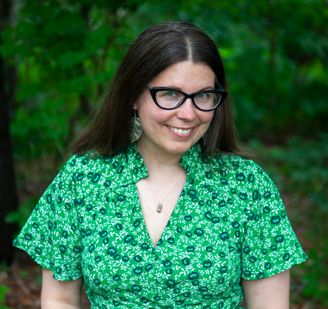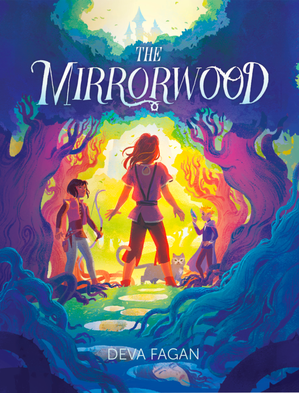| Deva Fagan (she/her) is the author of Rival Magic, Nightingale, Circus Galacticus and other books for young readers. She lives in Maine with her husband and her dog. When she’s not writing she spends her time reading, playing video games, doing geometry, and drinking copious amounts of tea. We recently read and loved her most recent novel, The Mirrorwood, and were thrilled to get the chance to interview her about favorite characters, inspiration, and more! Rapunzel Reads: The Mirrorwood's characters are phenomenal and all strikingly unique--I particularly loved Lyrian and Vycorax, who always did what I least expected them to in the best possible way. Do you have a favorite character? If so, why are they your favorite? Deva Fagan: I’m so glad you loved the characters and that they surprised you! They surprised me too sometimes! The most fun character to write was definitely Moth, the talking cat. I love cats but sadly I’m allergic and thus have never had a cat of my own (I do have a lovely and adorable dog though!). So in a way, writing about Moth was a chance to have a cat of my own without sneezing my nose off! | Author photo credit: Paul Van Der Werf |
RR: What books inspired you when you were growing up?
DF: I devoured pretty much any science fiction and fantasy novel I could find as a kid! Some of my favorites were Lloyd Alexander’s Chronicles of Prydain series (which introduced me to the concept of retellings with it’s use of Welsh mythology), the work of Diana Wynne Jones (which showed me how you can have a story that is both tremendously funny and also heartfelt and meaningful), and The Darkangel by Meredith Ann Pierce, which was full of gorgeous imagery and is also responsible for my love of lonely, tormented, wicked princes.
RR: The plot of The Mirrorwood was utterly absorbing, and the twists and turns were some of the most unexpected and clever I've read in middle-grade fantasy. How did you go about creating these storylines?
DF: I generally work from an outline, so some of the twists and turns were planned in advance, based on various expectations and assumptions I wanted to deliberately subvert. But a lot of elements came together (or appeared for the first time!) while I was writing! I often find that something I mention in an early chapter comes back to fill some important role later on; my subconscious is doing more work than I think it is!
As an example, when I outlined the scene at the barrow mound where Fable and Vycorax try to get the Withering’s tooth, I had no idea that they would need to convince the skull of an obstreperous long-dead bard to help them! I think my outline just said “and then they do something cool to find the tooth.” When I got to that chapter, Dendonderus just sprang to life and burst into the scene. Those moments are some of the best parts of writing! It really feels like the story is a living thing!
RR: What is your favorite part about the world of The Mirrorwood?
DF: If I could only visit one part of the world, it would be the magical, mixed-up library with its flocks of flying books!
RR: Do you have any tips for an aspiring writer?
DF: Read a lot! And when you find books you love, spend some time thinking about WHY you love them.
Don’t be afraid of failure! It is practically impossible to get a story right the first time. I myself always make major changes to my first drafts— sometimes I write a dozen different first chapters or first paragraphs before I find the right one. But all that work is part of the process!
RR: There’s a strong thread throughout The Mirrorwood that almost subverts the ideas of good and evil you find in traditional fantasy stories, particularly fairytales, which I absolutely loved. What inspired this more nuanced approach to something that is usually very absolute?
DF: One of the best and worst things about fairytales is that they are so absolute and so straightforward. Of course it would be a much easier world to navigate if beautiful things were always good and virtuous, if you were guaranteed to stay safe from wolves if you kept to the path. That’s part of what makes fairytales appealing! We want answers. We want to know how to make it safely to grandmother’s house!
But I think even as kids, we know it’s not so simple. Good people get sick. Mean people get rich and powerful. Kids are smart! They see this. So I do think as storytellers, it’s part of our job to question those assumptions. To take old stories and ask questions. Why is the wicked prince so bad? Who decided that the fairy godmother’s magic is a blessing?
RR: What are you planning on writing next?
DF: I’m currently finishing up a new middle grade novel that will be out in 2024! It’s about a girl who lives in an opulent, sinking city where magical games rule all, who believes that if she just follows the rules, she can make her dreams come true. But when she joins a team of outcasts and misfits to compete in the most dangerous game of all, she learns that the rules aren’t as fair as she thinks. I’m really excited to share this one with the world, since I am a dedicated gamer myself!





 RSS Feed
RSS Feed
